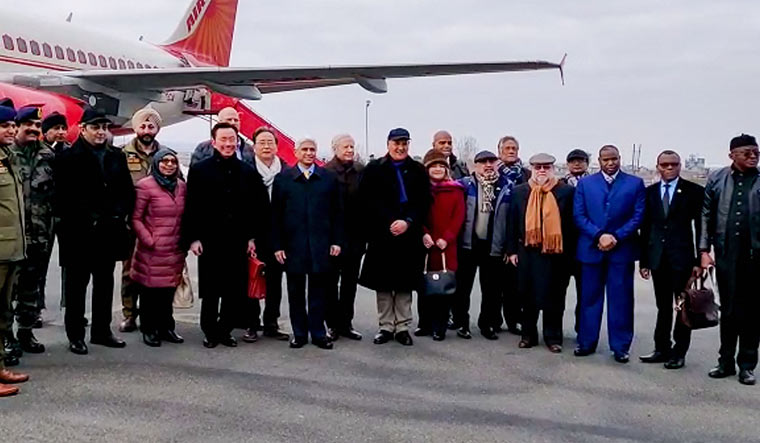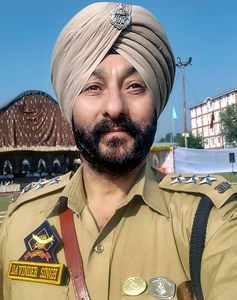ON JANUARY 11, officers of the Jammu and Kashmir Police carried out a stunning operation at a checkpoint on the Jammu-Srinagar highway. They flagged down a private car at Wanpoh in Kulgam district and arrested four men. Two of them were Hizbul Mujahideen militants Naveed Babu and Asif Rather, who were allegedly involved in the killing of non-Kashmiri workers last year. The third man was a lawyer, Rafi Ahmed, and the fourth was Davinder Singh, a deputy superintendent of police who had won the Sher-e-Kashmir Police Medal for Gallantry for his role in an anti-militant operation in 2017.
The police say Singh, who had been part of the official team that received foreign diplomats who visited Kashmir in January, was ferrying the militants to Jammu. “He was arrested when he was driving a car carrying militants; [it] is a heinous crime,” said Vijay Kumar, inspector-general of police. “That is why he is being treated at par with the militants.”
Singh had joined the police in 1990, after graduating from Amar Singh College in Srinagar. He was part of the police’s elite anti-insurgency unit, the Special Operations Group, for a decade. In the late 1990s, Singh got an early promotion to inspector for his role in anti-militancy operations. He was shot in his leg during one such operation, and it left him with a limp.
Naveed was also a former police constable. He joined Hizbul in June 2017, after stealing four Kalashnikovs from a police post in Budgam. He and Asif were wanted for their alleged role in the killing of non-Kashmiri truckers and labourers in Shopian district, which took place last year after Jammu and Kashmir’s special status was revoked. Naveed was also allegedly involved in the burning of an apple orchard in Shopian. According to the police, 18 first information reports have been registered against him.
A top police officer told THE WEEK that Singh had been under surveillance for several weeks because of his “suspicious” activities. “We have an effective system in place to keep an eye on all our men,” said the officer. “This is one of the most important operations that the police have carried out in three decades.”
Inquiries have found that Singh’s links with Naveed ran deep. Both of them hail from Tral in Pulwama district—a hotbed of militancy. It was Singh who reportedly brought Naveed to Srinagar. The police suspect that Naveed had stayed in Singh’s Indira Nagar house, which is close to the Army’s 15 Corps headquarters. Arms and ammunition have been recovered from the house.
The operation to nab Singh was apparently planned soon after he set off for Jammu with the militants. A police team led by Deputy Inspector General (south Kashmir) Atul Goel sprang the trap at Wanpoh. “The presence of Goel’s team left Singh and his accomplices stunned,” said a source. Singh reportedly told Goel that the men with him were his personal security officers, and that the police were jeopardising an operation by stopping them.
IGP Vijay Kumar said Singh had been booked under the Unlawful Activities (Prevention) Act and the Arms Act. The four men are being interrogated by a joint team of police personnel and officers from the Intelligence Bureau and the Research and Analysis Wing. Apparently, Singh is sticking to his claim that he was carrying out an operation that could have won laurels for the police.
The police say Singh was involved in illegal activities and extortion. He owns an orchard in Tral, two houses in Srinagar, a house in Jammu and a flat in Delhi. He and his wife, a teacher, have two daughters and a son; the daughters are pursuing MBBS in Bangladesh, while the son is in class 12.
This is not the first time Singh has come under the scanner. In 1993, he faced an investigation for seizing a contingent of cannabis and reselling it on the black market. “The inquiry found him guilty and recommended his dismissal from the force,” said a source. “But a high-ranking officer exonerated him and prevented his dismissal.”
He also faced an inquiry while he was in the SOG. He was suspected of accepting bribes to release a truck loaded with diary products. The inquiry found him guilty, but Singh was let off again. “The only motivation for his support to militants seems to be money,” said a top officer. “He may also have been trying to soften the militants’ hostility to him.”
The officer said Rafi Ahmed, the arrested lawyer, was a resident of Keller in Pulwama. Rafi’s father was a militant who was killed the 1990s, and he had allegedly been helping people cross over to Pakistan. “It seems he was taken along for the same purpose. Naveed might have been planning to move to Pakistan,” said the officer.
Afzal Guru, who was executed for his role in the 2001 Parliament attack, had named Singh in a letter to his lawyer in 2004. Guru wrote that Singh had introduced him to one of the men who later took part in the attack. He alleged that it was at Singh’s instance that he arranged for a car and a room for the attacker in Delhi.
In a 2006 interview with a journalist, Singh himself admitted to torturing Guru. “I did interrogate and torture him at my camp for several days,” Singh said. “We poured petrol in his a** and gave him electric shocks. But I could not break him. He did not reveal anything to me despite our hardest possible interrogation.”
Vijay Kumar, however, said there was no record linking Singh with Guru. The police said Singh was suspended soon after his arrest, and that his office at the Srinagar airport, where he was part of the anti-hijacking squad, had been sealed.



